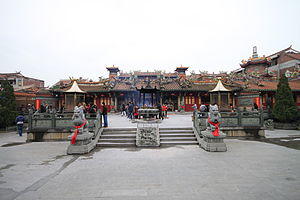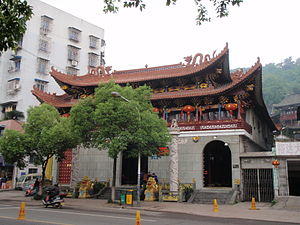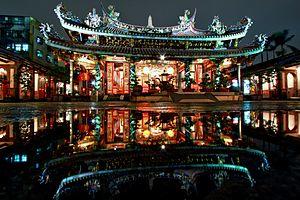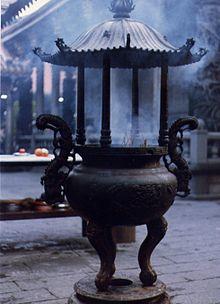Chinese temple architecture refer to a type of structures used as place of worship of Chinese Buddhism, Taoism or Chinese folk religion, where people revere ethnic Chinese gods and ancestors. They can be classified as:
- miào (廟) or diàn (殿), simply means "temple" and mostly enshrines gods of the Chinese pantheon, such as the Dragon King, Tudigong or Matsu; or mythical or historical figures, such as Guandi or Shennong.
- cí (祠), cítáng (祠堂), zōngcí (宗祠) or zǔmiào (祖廟), referring to ancestral temples, mostly enshrining the ancestral gods of a family or clan.
- Taoist temples and monasteries: 觀 guàn or 道觀 dàoguàn; and
- Chinese Buddhist temples and monasteries: 寺 sì or 寺院 sìyuàn
- Temple of Confucius which usually functions as both temple and town school: 文廟 wénmiào or 孔廟 kŏngmiào.
- Temples of City God (城隍廟), which worships the patron God of a village, town or a city.
- Smaller household shrines or votive niche, such as the worship of Zaoshen and Caishen.
Gōng (宮), meaning "palace" is a term used for a templar complex of multiple buildings, while yuàn (院), meaning "institution," is a generic term meaning "sanctuary" or "shrine".
Overview
Shen temples are distinct from Taoist temples in that they are established and administered by local managers, village communities, lineage congregations and worship associations. They don't have professional priests, although Taoist priests, fashi, Confucian lisheng, and also wu and tongji shamans, may perform services within the temples. Shenist temples are usually small and decorated with traditional figures on their roofs (dragons and deities), although some evolve into significant structures.
Chinese temples can be found throughout Mainland China and Taiwan, and also where Chinese expatriate communities have settled. An old name in English for Chinese traditional temples is "joss house".[1] "Joss" is an Anglicized spelling of deus, the Portuguese word for "god". The term "joss house" was in common use in English in the nineteenth century, for example in North America during frontier times, when joss houses were a common feature of Chinatowns. The name "joss house" describes the environment of worship. Joss sticks, a kind of incense, are burned inside and outside of the temple.
See also
- Taoist temple
- Confucian temple
- Chinese ritual mastery traditions
- Chinese folk religion
- Chinese folk religion in Southeast Asia
- Tin Hau temples in Hong Kong
- Kwan Tai temples in Hong Kong
- Chinese temples in Kolkata
References
- ^ R., J (Supercargo) (1822). Diary of a journey overland, through the Maritime Provinces of China from Manchao, on the south coast of Hainan, to Canton in the years 1819 and 1820. Sir Richard Philips & Co.



